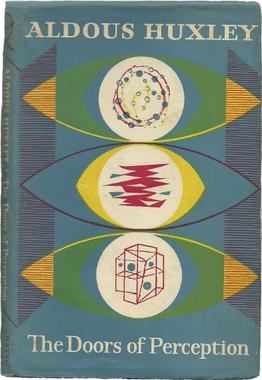The Doors of Perception
The Doors of Perception is a philosophical work by Aldous Huxley published in 1954. The book details his experiences when taking mescaline, a psychedelic drug derived from the peyote cactus. The title of the book is derived from a quote by William Blake: "If the doors of perception were cleansed every thing would appear to man as it is, infinite."
Background[edit | edit source]
Aldous Huxley was a prominent English writer and philosopher, best known for his novels such as Brave New World. In the early 1950s, Huxley became interested in the potential of psychedelic substances to expand human consciousness. His interest was partly inspired by the work of Humphry Osmond, a British psychiatrist who was researching the effects of mescaline.
Content[edit | edit source]
In The Doors of Perception, Huxley describes his mescaline experience in detail. He recounts how the drug altered his perception of reality, making ordinary objects appear extraordinary and filled with significance. Huxley discusses the implications of these altered states of consciousness for understanding the nature of reality and the human mind.
Perception and Reality[edit | edit source]
Huxley argues that the human mind filters reality to make it manageable, but this filtering process limits our perception. Under the influence of mescaline, these filters are removed, allowing a more direct experience of reality. He suggests that this unfiltered perception can provide valuable insights into the nature of existence.
Art and Religion[edit | edit source]
Huxley also explores the connections between his mescaline experience and various forms of art and religious experiences. He draws parallels between the visionary experiences induced by mescaline and the visions described by mystics and artists. Huxley suggests that these experiences can offer a deeper understanding of art and spirituality.
Influence[edit | edit source]
The Doors of Perception had a significant impact on the counterculture movement of the 1960s and 1970s. It influenced a generation of artists, musicians, and thinkers who were interested in exploring altered states of consciousness. The book also contributed to the growing interest in psychedelic research and the use of psychedelics in psychotherapy.
Legacy[edit | edit source]
The book's title inspired the name of the American rock band The Doors, whose lead singer Jim Morrison was a fan of Huxley's work. The Doors of Perception remains a seminal work in the literature on psychedelics and continues to be read and discussed by those interested in the nature of consciousness and perception.
See also[edit | edit source]
- Aldous Huxley
- Mescaline
- Peyote
- Psychedelic research
- Humphry Osmond
- William Blake
- Brave New World
- The Doors
References[edit | edit source]
- redirect Template:philo-book-stub
|
Navigation: Wellness - Encyclopedia - Health topics - Disease Index - Drugs - World Directory - Gray's Anatomy - Keto diet - Recipes
Search WikiMD
Ad.Tired of being Overweight? Try W8MD's physician weight loss program.
Semaglutide (Ozempic / Wegovy and Tirzepatide (Mounjaro / Zepbound) available.
Advertise on WikiMD
WikiMD is not a substitute for professional medical advice. See full disclaimer.
Credits:Most images are courtesy of Wikimedia commons, and templates Wikipedia, licensed under CC BY SA or similar.Contributors: Prab R. Tumpati, MD





